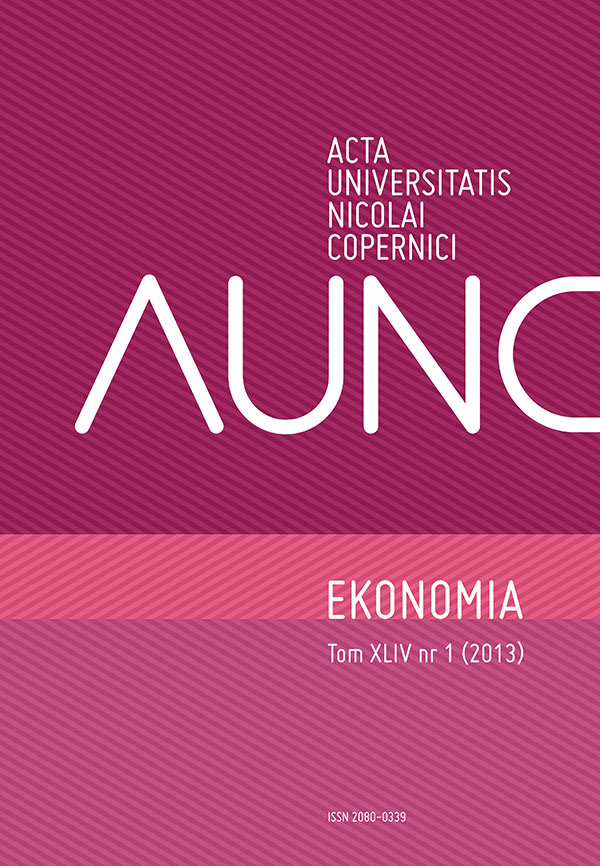Formy internacjonalizacji non-equity a bezpośrednie inwestycje zagraniczne – implikacje dla polskiej gospodarki
DOI:
https://doi.org/10.12775/AUNC_EKON.2013.003Słowa kluczowe
powiązania non-equity (NEMs), bezpośrednie inwestycje zagraniczne (BIZ), internacjonalizacjaAbstrakt
Wyrazem rosnącej internacjonalizacji działalności w globalizującej się gospodarce są powiązania non-equity (NEMs). Stanowią one jedną z form kontrolowania przez KTN łańcucha globalnej wartości. W stosunku do BIZ należy postrzegać, jako alternatywne, ale także komplementarne formy internacjonalizacji działalności. Z uwagi na zbliżone do BIZ uwarunkowania ich rozwoju można je traktować jako czynnik podnoszący efekty internacjonalizacji przedsiębiorstwa poprzez BIZ.Bibliografia
Anderson E., Gatignon H. (1986), Modes of Foreign Entry: a Transaction Cost Analysis and Propositions, „Journal of International Business Studies”, 3, 1–26, DOI: http://dx.doi.org/10.1057/palgrave.jibs.8490432.
Anderson O. (1997), Internationalization and market entry mode: a review of theories of conceptual frameworks, „Management International Review”, 37, 27–42.
Axinn C. N., Matthyssens P. (2001), Limits of internationalization theories in an unlimited world, „Internationalization Marketing Review”, 19(5), 436–449, DOI: http://dx.doi.org/10.1108/02651330210445275.
Branża motoryzacyjna 2012, raport, PZPM 2012, 15–21, 37–38.
Buckley P. J., Casson M. (1985), The economic theory of the multinational enterprise, Macmillan, London.
Calof J., Beamish P. W. (1995), Adapting to foreign markets: explaining internationalizations, „International Business Review”, 4(2), 115–131, DOI: http://dx.doi.org/10.1016/0969-5931(95)00001-G.
Eicher T., Kang J. (2002), Trade, foreign direct investment or acquisition: optimal entry modes for multinationals, University of Washington, Washington, http://faculty.washington.edu/te/papers/eicherkang.pdf (22.11.2012).
Gołębiowski T., Witek-Hajduk M. (2007), Formy internacjonalizacji polskich przedsiębiorstw, „Marketing i Rynek”, 2, 16–18.
Gorynia M. (2007), Strategie zagranicznej ekspansji przedsiębiorstw, PWE, Warszawa.
Hollensen S. (2004), Global marketing. A decision-oriented approach, Pearson Education Ltd, London.
Jaka naprawdę jest branża motoryzacyjna w Polsce, Know-how, produkcja, dystrybucja, usługi – raport 2010, PAIIZ, Funkcja konsumentów, SDCM, http://www.motoryzacjawpolsce.pl, (22.10.2012).
Kumar V., Subramaniam V. (1997), A contingency framework for the mode of entry decision, „Journal of World Business”, 32(1), 53–72, DOI: http://dx.doi.org/10.1016/S1090-9516(97)90025-0.
Luostarinen P., Hellman H. (1993), Internationalization process and strategies of Finnish family enterprises, [w:] Vertanen M. (red.), Proceedings of the Conference on the Development, Ministry of Trade and Industry Studies and Reports, Helsinki, 59, 2–37.
Melin L. (1992), Internationalization as a strategy process, „Strategic Management Journal”, 13, 99–118, DOI: http://dx.doi.org/10.1002/smj.4250130908.
Noga A. (2009), Teorie przedsiębiorstw, PWE, Warszawa.
Pakulska T., Poniatowska-Jaksch M. (2012) Znaczenie BIZ w sektorach innowacyjnych wysokich technologii dla polskiej gospodarki, ekspertyza na zlecenie Departamentu Strategii Analiz Ministerstwa Gospodarki, Warszawa.
Pan Y., Tse D. (1999), The impact of order and mode of market entry on profitability and market share, „Journal of International Business Studies”, 30(1), 81–103, DOI: http://dx.doi.org/10.1057/palgrave.jibs.8490061.
Pierścionek Z. (2007), Strategie konkurencji i rozwoju przedsiębiorstw, Wydawnictwo Naukowe PWN, Warszawa.
Poniatowska-Jaksch M. (2006), Przemysłowe bezpośrednie inwestycje zagraniczne źródłem konkurencyjności regionu, „Monografie i Opracowania” nr 544, Wyd. SGH, Warszawa.
Stonehouse G., Hamill J., Campbell D., Purdie T. (2001), Globalizacja. Strategia i zarządzanie, Felberg SJA, Warszawa.
Raport branży motoryzacyjnej 2011, PZPM 2011, 16–36.
Root F. (1994), Entry strategies for international markets, Lexington Books. London.
Rozkwitalska M. (2007), Zarządzanie międzynarodowe, Difin, Warszawa.
Welch L. S., Luostarinen R. K. (1993), Inward-outward connections in internationalization, „Journal of International Marketing”, 1(1), 44–56.
Wild J. J., Wild K. L, Han J. C. Y. (2006), International Business. The challenges of globalization, 3rd ed., Pearson, Upper Saddle River, New Jersey.
Williamson O. E. (1983), Credible Commitments: Using Hostages to Support Exchange, „American Economic Review”, 73(4), 519–540.
World Investment Report 2010: Investing in a Low-Carbon Economy (2010), United Nations – UNCTAD, New York–Geneva.
World Investment Report 2011. Non-Equity Modes of International Production and Development, UNCTAD, New York and Geneva 2011.
Zagraniczne inwestycje bezpośrednie w Polsce 2011 (USD), http://nbp.pl/home.aspx?f=/publikacje/zib/zib.html (23.11.2012).
http://elektronikab2b.pl/raporty/ (26.10.2012).
http://www.paiz.gov.pl/ (9.11.2012).
http://www.paiz.gov.pl/sektory/motoryzacja (26.11.2012).
http://www.pzpm.org.pl (25.11.2013).
Pobrania
Opublikowane
Jak cytować
Numer
Dział
Licencja
Autorzy, których teksty zostaną przyjęte do publikacji, po uzyskaniu pozytywnych recenzji wydawniczych oraz zaakceptowaniu do publikacji przez Komitet Redakcyjny, podpisują umowę licencyjną.
Statystyki
Liczba wyświetleń i pobrań: 836
Liczba cytowań: 0



